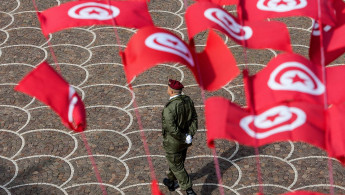Tunisia's Islamist Ennahda party may choose outside candidate as PM
Tunisia’s Islamist Ennahda party could pick a candidate from outside its ranks to head the government, two sources said on Friday, according to Reuters.
The move comes as Ennahda, which won 52 of 217 seats in last month’s parliamentary election, seeks consensus with other parties for a coalition.
“There is possibility that a figure from outside the party will be nominated to head the next government,” a senior Ennahda official told Reuters.
“Ennahda is likely to accept the presidency of parliament and approve an independent figure that can win the confidence of all parties involved in the coalition.”
The party is due to discuss the issue on Saturday and Sunday, the official added.
Another source suggested former former parliament speaker Mustapha Ben Jaafar and two former finance ministers Elyes Fakhfakh and Fadel Abdel Kefi were among potential candidates, though no official confirmation was made.
Ennahda previously sought to place one of of its leaders as prime minister because of the electoral mandate, however the move was rejected by potential partners: Attayar with 22 seats, Achaab’s Movement with 16 seats and current Prime Minister Youssef Chahed’s Tahya Tounes party with 14.
Only the Conservative Karama coalition, with 21 seats, agreed.
Read more: 'Turning a new page': Tunisia picks law professor as new president
Meanwhile, Heart of Tunisia, which holds 38 seats and is led by the media magnate Nabil Karoui, and the Free Constitutional Party led by Abir Moussa, with 17 seats, have been excluded from the talks.
The announcement for Ennahda’s prime minister is due to be revealed next week, however, if it is unable to form a cabinet, the country’s faces another election.
The developments came just weeks after Tunisia's new President Kais Saied took the oath of office after his surprise election victory over champions of the political establishment.
Saied, a conservative academic with no previous political experience who won the overwhelming support of younger voters in an 13 October runoff, was sworn in before members of the constituent assembly and other top state bodies.
The poll followed the death in July of Beji Caid Essebsi, Tunisia's first president freely elected by universal suffrage.
Read more: Kais Saied: "Robocop" newcomer poised to be Tunisia's next president
After sweeping 72.71 percent of the vote in this month's runoff, Saied has won a clear mandate to fight corruption and promote social justice, even though his role focuses on security and diplomacy.
A constitutional law professor whose rigid and austere demeanour earned him the nickname "Robocop", Saied has no real experience in foreign policy.
Tunis, which currently chairs the Arab League, could renew diplomatic ties with Syria, severed since 2012, and play a role in the return of the war-torn country to the bloc.
Saied has made strong statements against Israel, considering any ties with the state to be "high treason" - an Arab nationalist position that earned him praise among supporters.
While the security situation has significantly improved since a series of high-profile attacks on tourists in 2015, Tunisia has maintained a state of emergency for four years, with assaults against security forces persisting.
During the campaign debate, Saied said a key to fighting terrorism was education, arguing that improving primary education would "immunise" youth against extremism.
Another significant task he will face is reforming the police force, which was a cog in the dictatorship toppled by the Arab Spring revolt of 2011 and which continues to be accused of human rights abuses.
Follow us on Twitter and Instagram to stay connected!





 Follow the Middle East's top stories in English at The New Arab on Google News
Follow the Middle East's top stories in English at The New Arab on Google News
![The UAE is widely suspected of arming the RSF militia [Getty]](/sites/default/files/styles/image_330x185/public/2024-11/GettyImages-472529908.jpg?h=69f2b9d0&itok=Yauw3YTG)
![Netanyahu furiously denounced the ICC [Getty]](/sites/default/files/styles/image_330x185/public/2024-11/GettyImages-2169352575.jpg?h=199d8c1f&itok=-vRiruf5)
![Both Hamas and the Palestinian Authority welcomed the ICC arrest warrants [Getty]](/sites/default/files/styles/image_330x185/public/2024-11/GettyImages-2178351173.jpg?h=199d8c1f&itok=TV858iVg)